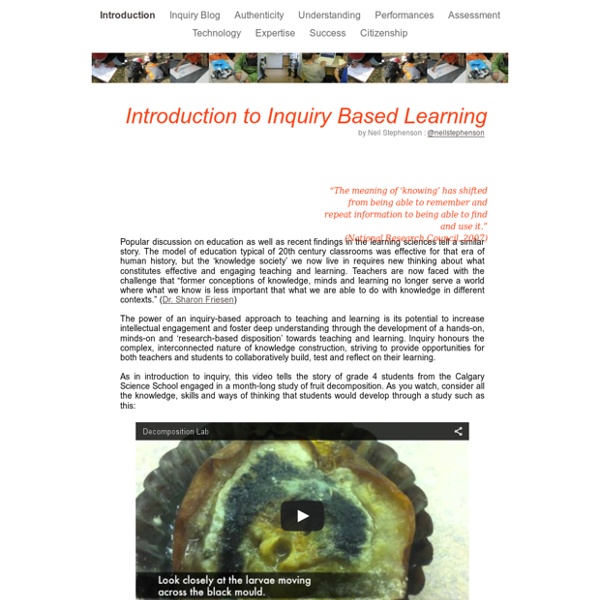AEC394/WC075: What Is Inquiry-Based Instruction?
Anna J. Warner and Brian E. Myers2
Inquiry-based Learning: Explanation
What is inquiry-based learning? An old adage states: "Tell me and I forget, show me and I remember, involve me and I understand." The last part of this statement is the essence of inquiry-based learning, says our workshop author Joe Exline 1. Inquiry implies involvement that leads to understanding.
What Is Inquiry?
Read Article in Spanish Inquiry is a dynamic process of being open to wonder and puzzlement and coming to know and understand the world. As such, it is a stance that pervades all aspects of life and is essential to the way in which knowledge is created.
Inquiry-based learning
Inquiry-based learning (also enquiry-based learning in British English)[1] starts by posing questions, problems or scenarios—rather than simply presenting established facts or portraying a smooth path to knowledge. The process is often assisted by a facilitator. Inquirers will identify and research issues and questions to develop their knowledge or solutions. Inquiry-based learning includes problem-based learning, and is generally used in small scale investigations and projects, as well as research.[2] History[edit]
Secondgradealicious: Five for Friday???
Could it be? Could it really be? Ahhhh yes it is Friday. My long lost friend. My BFF.
Powerful Learning: Studies Show Deep Understanding Derives from Collaborative Methods
Today's students will enter a job market that values skills and abilities far different from the traditional workplace talents that so ably served their parents and grandparents. They must be able to crisply collect, synthesize, and analyze information, then conduct targeted research and work with others to employ that newfound knowledge. In essence, students must learn how to learn, while responding to endlessly changing technologies and social, economic, and global conditions. But what types of teaching and learning will develop these skills?
What is IBL? - The Academy of Inquiry Based Learning
Inquiry-Based Learning (IBL) is a student-centered method of teaching Mathematics. At the college mathematics level one of the forms of IBL is the Modified Moore Method, named after R. L. Moore.
Relief Teaching Ideas
This is an activity that is usually used in maths but I think it also works really well as a revision tool! Simply write an answer on the board, students then write questions to match the answer on post it notes. They can read through their notes or handouts to help them.
Fostering a Culture of Inquiry
How can we apply literary elements and work with local experts to create high-quality graphic novels? How do cycles of revision improve our artwork? How might we impact voter turnout for a local municipal election?
Inquiry-Based Lesson Plans
Inquiry Learning Student understanding is the central focus of inquiry learning. Students actively participate in inquiry learning experiences by developing questions and investigating to find solutions. Teachers facilitate learning as students engage in active problem solving, the construction of meaning and the communication of new understandings to students, teachers or other important adults. Teachers guide student learning by selecting, designing and planning learning tasks, asking probing questions, observing students at work to identify misconceptions and planning follow up experiences. Well constructed tasks allow students’ entry to the problem from different points, encourages divergent thinking and engages students in thinking like an expert in the field (mathematician, scientist, and historian).
The Go To Teacher: Inquiry Circles
We have started our Nonfiction Inquiry Unit and I am beside myself! I love, love, LOVE the way the students get so pumped about reading and learning facts!! To start out our reading unit, we used a modification of a Chart Chums chart to look into what it means to be an investigator. We changed Develop Theories into Research to help with our approach to inquiry. After picking research topics, we used our strategy of Questioning to help us guide our research. As the class was grouped off into their own inquiries we also did a class inquiry into space to model thinking and expectations.
Introduction to Inquiry Based Learning
At the Calgary Science School we focus on inquiry-based learning, technology-intergration and outdoor/environmental education. We believe these three pillars come together to provide students with opportunities for authentic, meaningful and relevant learning. At the core of our program is inquiry - an approach to learning and teaching (including teacher learning) that is the foundation of all we do. Our thinking around inquiry is that it is more than just 'doing projects' but is rather nurturing a dispostion toward critical thinking, reflection and idea improvement in all learners in our building.



